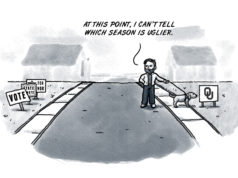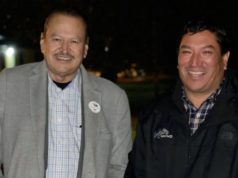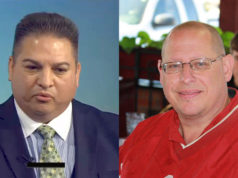
In a February 2013 press release from the Oklahoma Department of Labor, Mark Costello supported a proposed bill that could have converted the statewide elected office he then held — and others — into an appointed cabinet-level position.
Weeks after Mr. Costello’s death, multiple signs and sources point to Gov. Mary Fallin entertaining some sort of effort to follow through on the government-modernization idea.
What remains to be seen is how many of Oklahoma’s other 10 statewide elected offices could be proposed for conversion from elected to appointed positions.
NonDoc has not learned of any specific plan, but the expected policy push does mean anyone appointed labor commissioner will likely be asked to lead the way off the ballot.
“This isn’t just conjecture,” said OU Political Science Department Chairman Keith Gaddie. “This has been widespread conversation of the political class.”
Alex Weintz, the governor’s communications director, chose his words more carefully.
“Gov. Fallin has said she is generally open to the idea.”
Gaddie said both Gov. Fallin, a Republican, and previous Gov. Brad Henry, a Democrat, have consistently pursued “opportunities to consolidate and modernize executive power in the state” when they are presented.
“We’ve gotten rid of positions in the past,” Gaddie said. “We used to have an elected inspector of mines. We used to have an elected secretary of charities. We’ve had a variety of elected positions that have disappeared over the years.”
Labor Commissioner, he suggested, is a prime example of an unnecessary elected office. Oklahoma is one of only four states that elects the position.
“We’ve never had a Labor Commissioner emergency,” Gaddie said. “We don’t need it, at least not as an elected official.”
Joe Dorman, who challenged Gov. Fallin in the 2014 election after serving 12 years as a Democrat in the Oklahoma House of Representatives, said such a modernization idea has a fair amount of bipartisan support.
“This has been proposed by Republicans, and I think it’s certainly an idea with merit to consider,” Dorman said. “Because, often times, you will have officials who will not do the job the way you expect, and this way the governor could hire and fire and bring in the best-qualified people.”
Dorman said he thinks it would be reasonable for Oklahoma governors to appoint almost all statewide positions, except attorney general and state auditor.
In general, Gaddie said, appointment processes can allow for a greater emphasis on administrative competence instead of political campaign proficiency. That could affect how Gov. Fallin handles the pending labor commissioner appointment, he said.
“In the past, whether through administrative reorganization or appointment, given opportunities to consolidate and modernize executive power in the state, both Gov. Henry and Gov. Fallin have done so,” Gaddie said. “It’s very important to consider that.”
Cathy Costello — Mark Costello’s widow — and members of her circle did not return calls and messages from NonDoc to discuss the matter. Mrs. Costello announced last week that she has requested Gov. Fallin to name her to the post, but it remains unclear whether she would support converting labor commissioner to a permanently appointed position.
“We have all these cabinet positions because 100-and-something years ago, in a fit of progressive peak, the people who created our state constitution broke executive power up in a million different directions,” Gaddie said. “They broke legislative power up in a million different directions with all these commissions and boards and statewide-elected officials.”
Looking back on SB 598 from the 2013 Oklahoma Legislature, Mark Costello not only supported moving labor commissioner, insurance commissioner and superintendent for public instruction to appointed positions like the bill proposed, but called for adding state treasurer into the discussion.
Any such modernization effort for changing statewide-elected officials would require a vote of the people to amend the state constitution. A recent column by Wayne Green of the Tulsa World detailed the 16-year period in state history when labor commissioner was not an elected position:
In fact, the people of Oklahoma didn’t elect the labor commissioner from 1974 to 1990. One of former Gov. David Boren’s wisest proposals was to reduce the state’s lengthy list of elective offices to a more manageable few. State Question 512, approved by voters in 1975, made the labor commissioner’s post appointive by the governor.
The previous history of the elected labor commissioners wasn’t stellar. The last elected labor commissioner before SQ 513, Wilbur Wright, resigned in 1973 after it was revealed that he was routinely submitting expense account claims that included more than 400 miles of daily driving on state business. On one of the days he claimed to be logging hundreds of miles for the state, Oklahoma’s highways were frozen shut by ice and snow. With possible criminal charges in the works, he resigned in 1973 and then got re-elected the next year. A year late [sic], he resigned again.
After a 12-year hiatus, the office was returned to the ballot by State Question 613, a regressive measure authored by one of Oklahoma’s most regressive legislators, former Rep. John Monks of Muskogee. Monks, who had been one of Wright’s staunchest defenders in the Legislature, said the office should be elective so the officeholder would be responsible to the people. I can think of one strong argument against that theory: Wilbur Wright.
State Question 512‘s ultimate legacy is that it allowed the public to move the position of chief inspector of mines from an elected post to an appointed post.
Meanwhile, the one-term labor commissioner that Mark Costello defeated in 2010 spent much of his term generating headlines for strange and potentially illegal acts. In addition to angering the Oklahoma Public Employees Association by entering an OPEA official’s office and ripping up a 2010 candidate survey, Lloyd Fields also raised eyebrows by allegedly attempting to pilfer a professional bull rider’s guitar at a party.
“They’ve been out there before talking about this,” Gaddie said of modernizing the governor’s cabinet. “It could be that the governor is looking at this (pending appointment) as an opportunity to consolidate down departments, to get somebody in there who would be inclined to help move the labor commissioner’s office toward being an appointed office if we have a constitutional restructuring of the cabinet offices.”





















